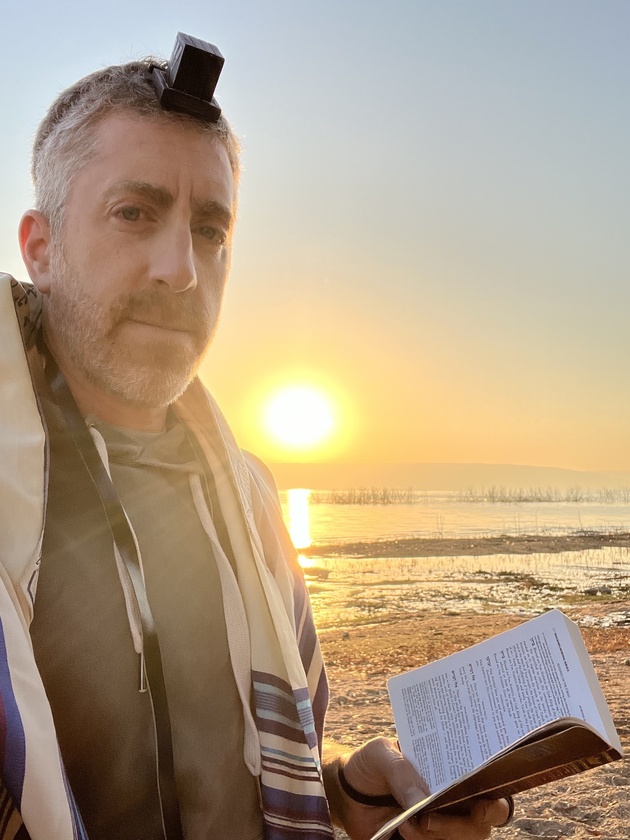I woke early on Friday to work and to watch the sunrise over the Sea of Galilee. I found the water somewhat lower, and the shore muddier, than in the heat of July, but I managed to enter the water in a dry spot and did my weekly pre-Sabbath immersion, with no one else around.
I ate, said goodbye to my companions, and drove into the Golan again -- this time, to meet my cousins at a natural spring called Ein Alamein, which has a pool that was apparently dug for Syrian army officers to enjoy when they controlled the area. Another immersion; a dream.
Then I drove back to the hotel, packed my bags, ate lunch at a nearby Aroma café, and drove west to Haifa. I visited the Carmel and the overlook that takes in the view of the Baha'i Temple and the bay. Lebanon was visible in the distance; a peaceful vista of a place of intense war.
I drove to Kiryat Motzkin, where I greeted my aunt and dropped my bags before jogging to the Mediterranean coast. There, I swam and immersed again, before jogging back. There were a few rocket sirens, followed by several booms as the Iron Dome took out several projectiles. I did not have time to seek shelter, and I did not need to; the rockets were a little too distant.
I made it back, showered and changed, and went to Shabbat services at a nearby Sephardic synagogue before enjoying Shabbat dinner with my aunt and one of my cousins. We had to duck inside the guest room -- which doubles as the "safe room" -- during a drone attack at 9:11 p.m. Overnight, my aunt came into the guest room at 4:18 a.m. during another rocket attack.
The morning was clear and bright, and I went to services, then walked to the sea again, before walking to the mayor's house to meet with him and discuss the view of the world from Motzkin, which appears to be an ordinary suburb but has many distinguished residents, including the commander of the Alpine Brigade whom I had met just two days before. He was on television on Saturday, showing a large rocket launcher that his troops had discovered on Har Dov, where I had been with him just 48 hours before. It was remarkable to see.
After a rest, I said my goodbyes and headed south -- this time to the town of Beit Shemesh, in the Judean Hills, for a lesson with one of my favorite rabbis, R' Eli Stefansky of Mercaz Daf Yomi. That was a real lift to my spirits after a long day wrestling with big, difficult questions.
Now I am at the Mediterranean gain, in the coastal city of Ashdod, in the predawn hours, waiting for a new day to begin. Back to the Gaza envelope today... and some family.
This week’s portion launches the great story of Abraham, who is told to leave everything of his life behind — except his immediate family — and to leave for “the Land that I shall show you.”
There’s something interesting in the fact that Abraham is told to leave his father’s house, as if breaking away from his father’s life — but his father, in fact, began the journey, moving from Ur to Haran (in last week’s portion). His father set a positive example — why should Abraham leave him?
Some obvious answers suggest themselves — adulthood, needing to make one’s own choices, his father not going far enough, etc.
But I think there is another answer. Abraham (known for the moment as Abram) needs to establish his own household. This is not just about making one’s own choice, but really about choosing one’s own starting point. It’s starting over.
Sometimes we start over in fundamental ways even if much that surrounds us remains the same. Sometimes the journey we have to ...
The story of Noah is familiar; the details, less so.
Noah is often seen as an ambivalent figure. He was righteous -- but only for his generation. What was his deficiency?
One answer suggests itself: knowing that the world was about to be flooded, he built an Ark for the animals and for his own family -- but did not try to save anyone else or to convince them to repent and change their ways (the prophet Jonah, later, would share that reluctance).
Abraham, later, would set himself apart by arguing with God -- with the Lord Himself! -- against the destruction of Sodom and Gomorrah, saying that they should be saved if there were enough righteous people to be found (there were not).
Still, Noah was good enough -- and sometimes, that really is sufficient to save the world. We don't need heroes every time -- just ordinary decency.
Hi all -- as I noted last month, I'm going to be closing down my Locals page, at least for tips and subscriptions -- I may keep the page up and the posts as well, but I'm no longer going to be accepting any kind of payment.
Look for cancelation in the very near future. Thank you for your support!
















